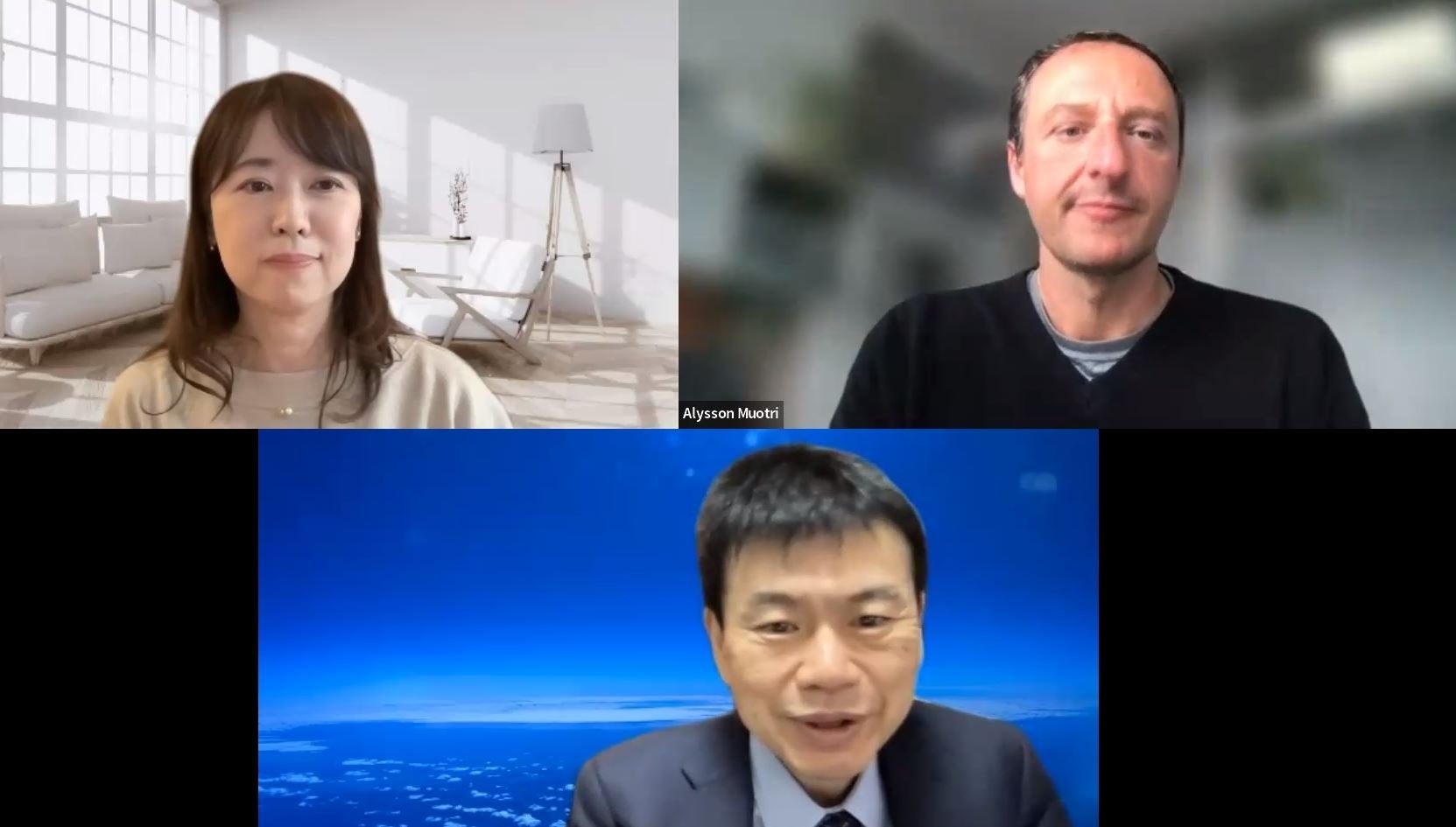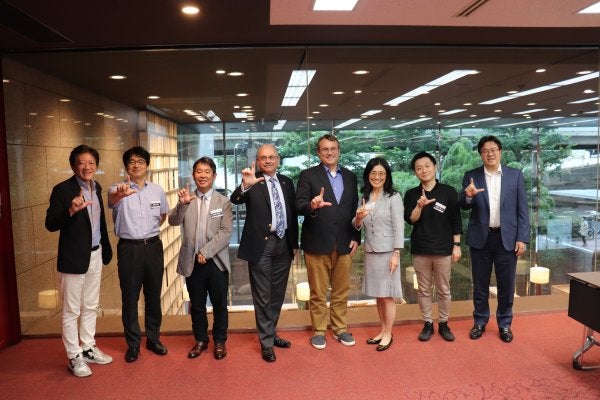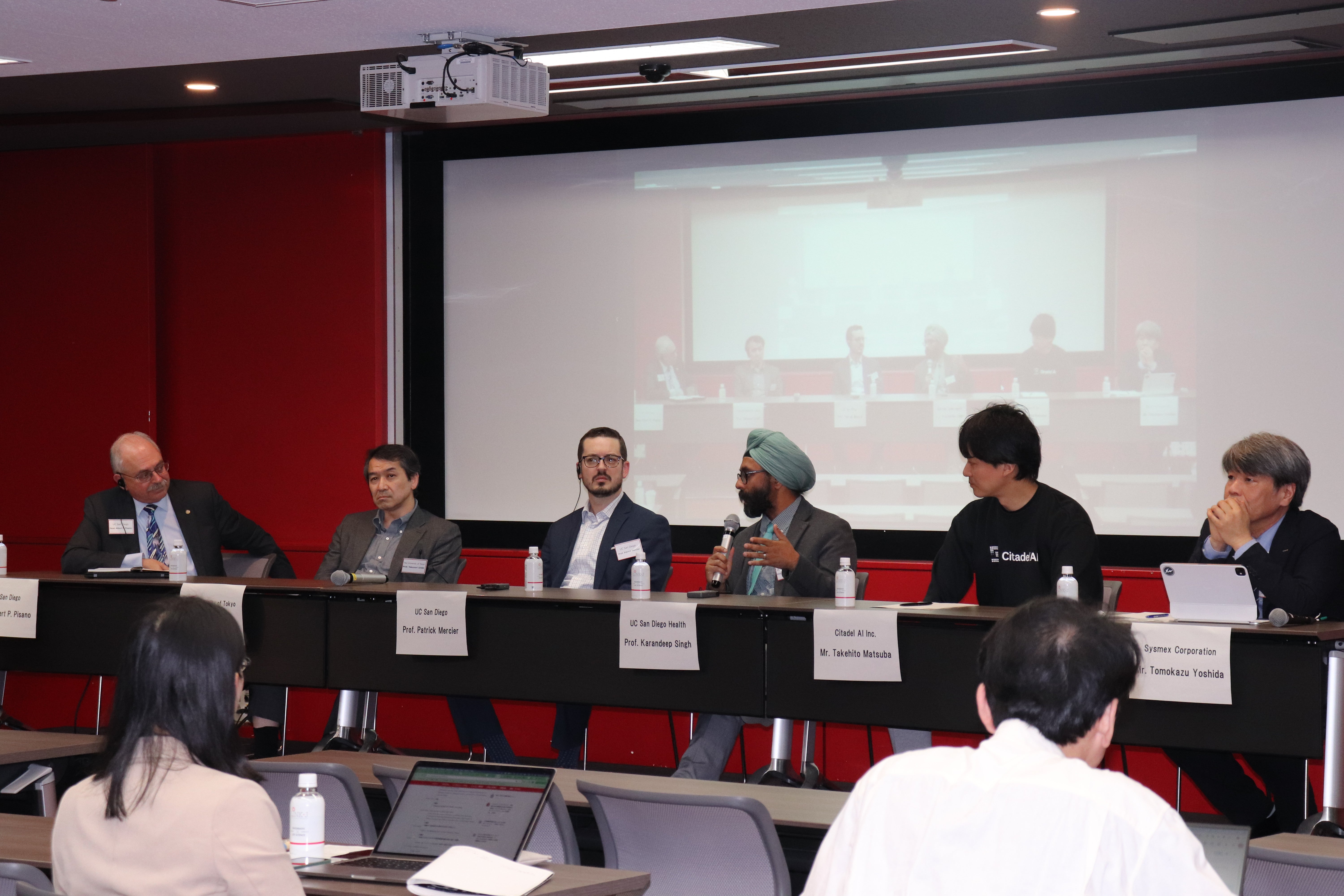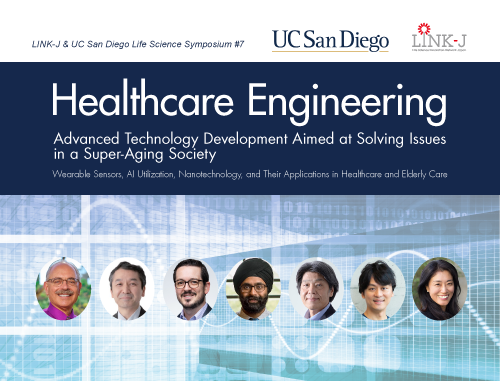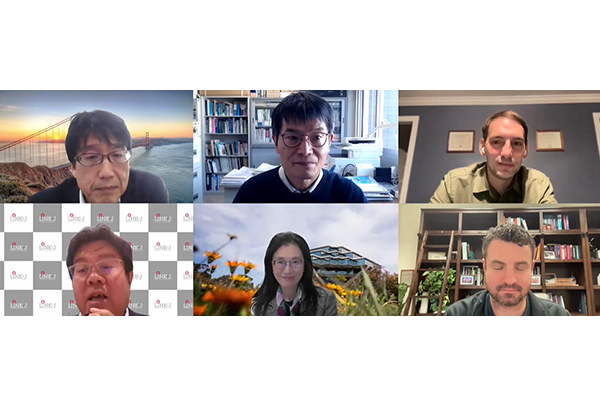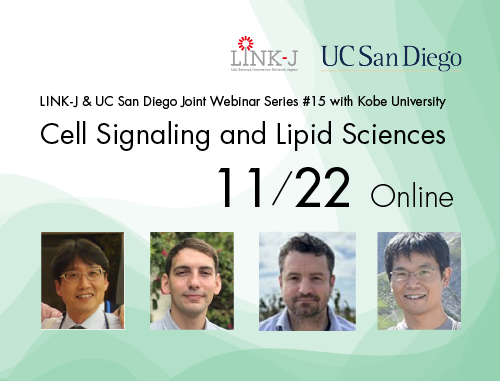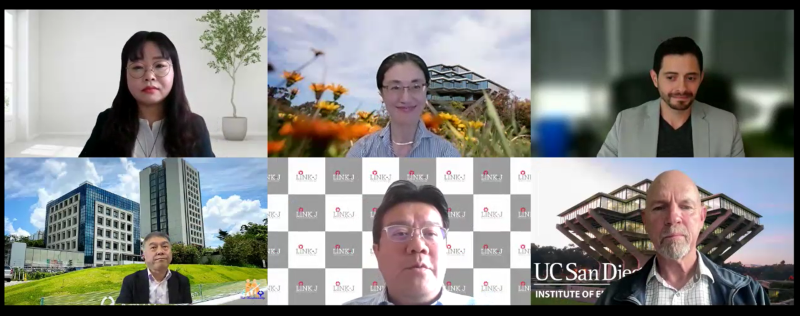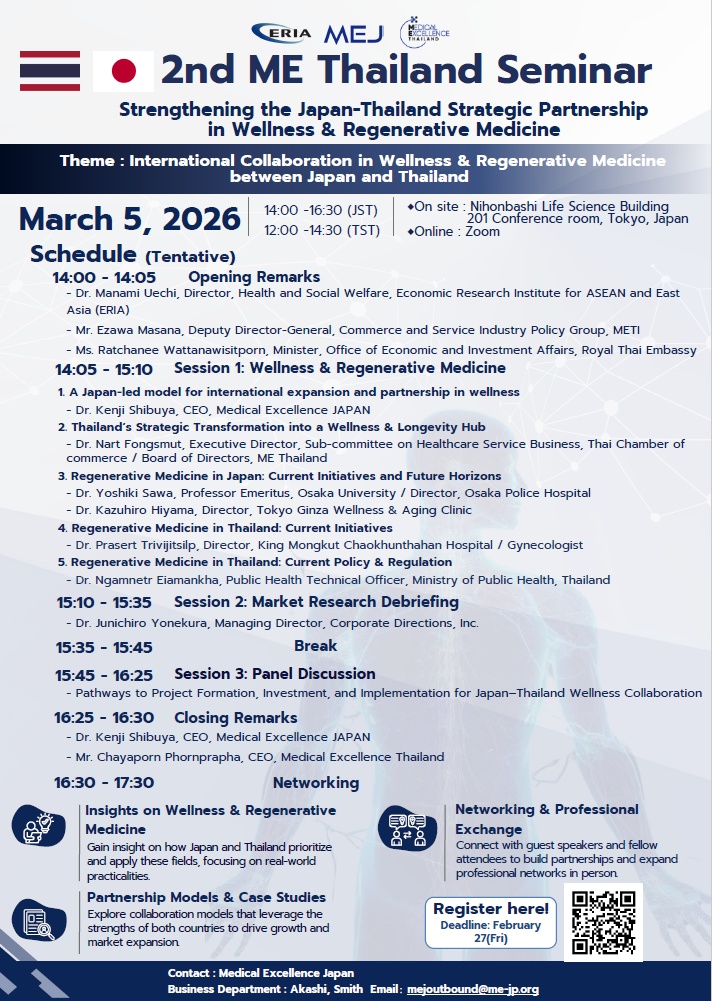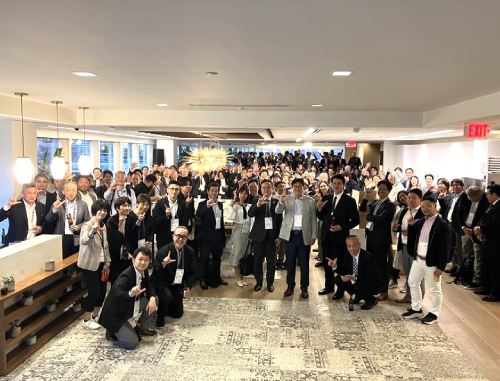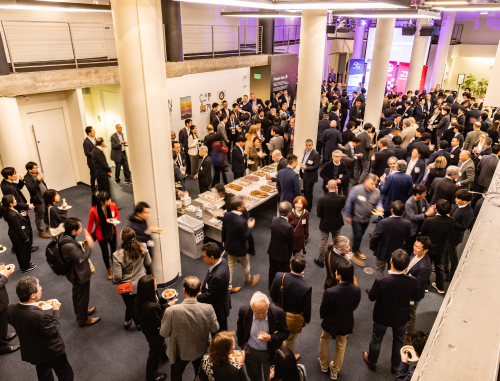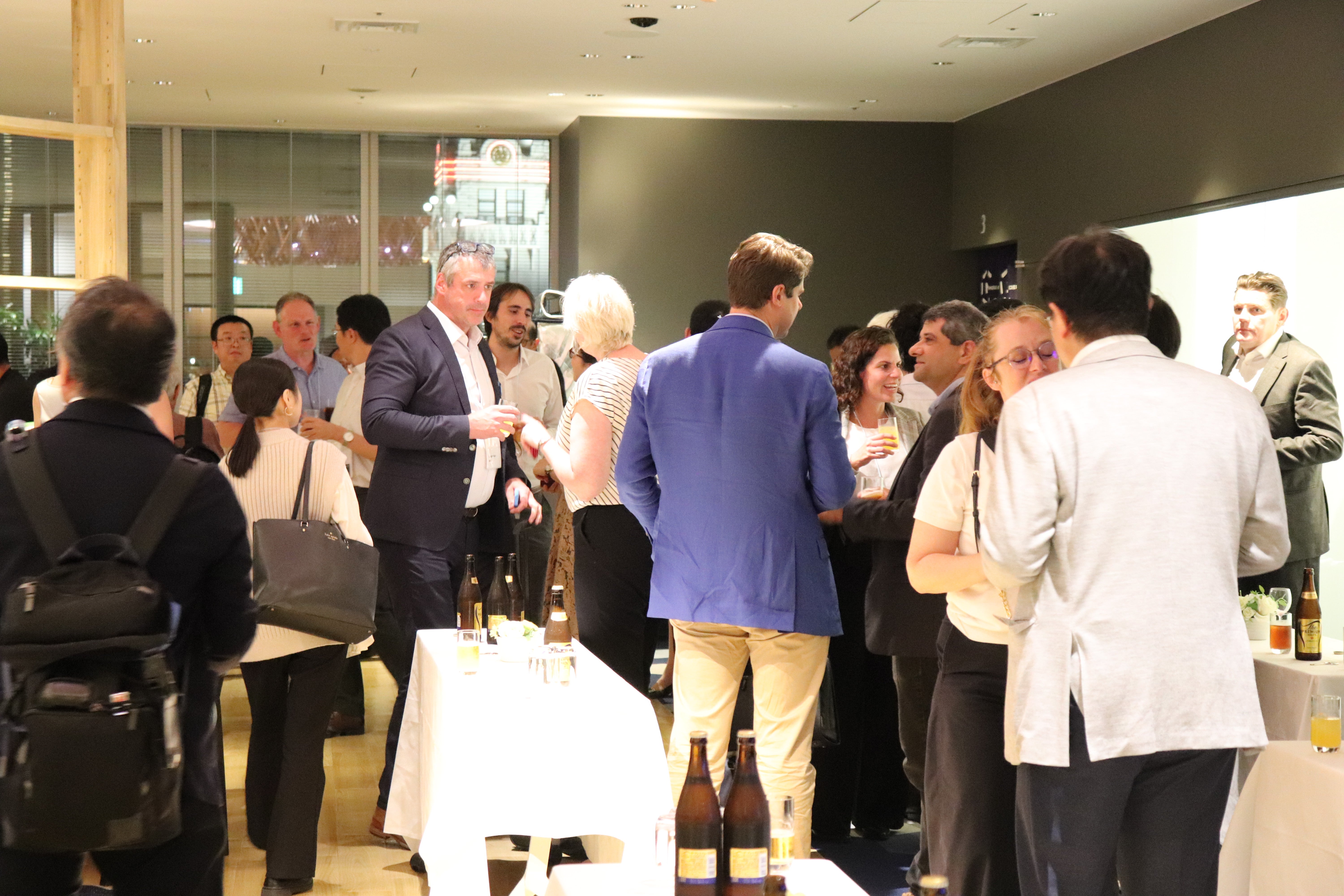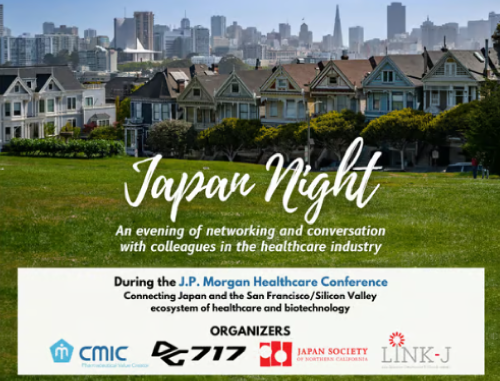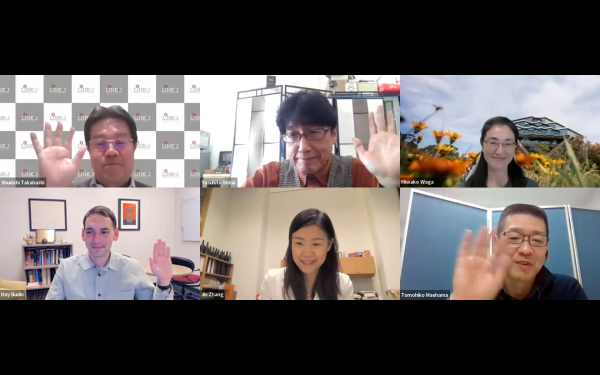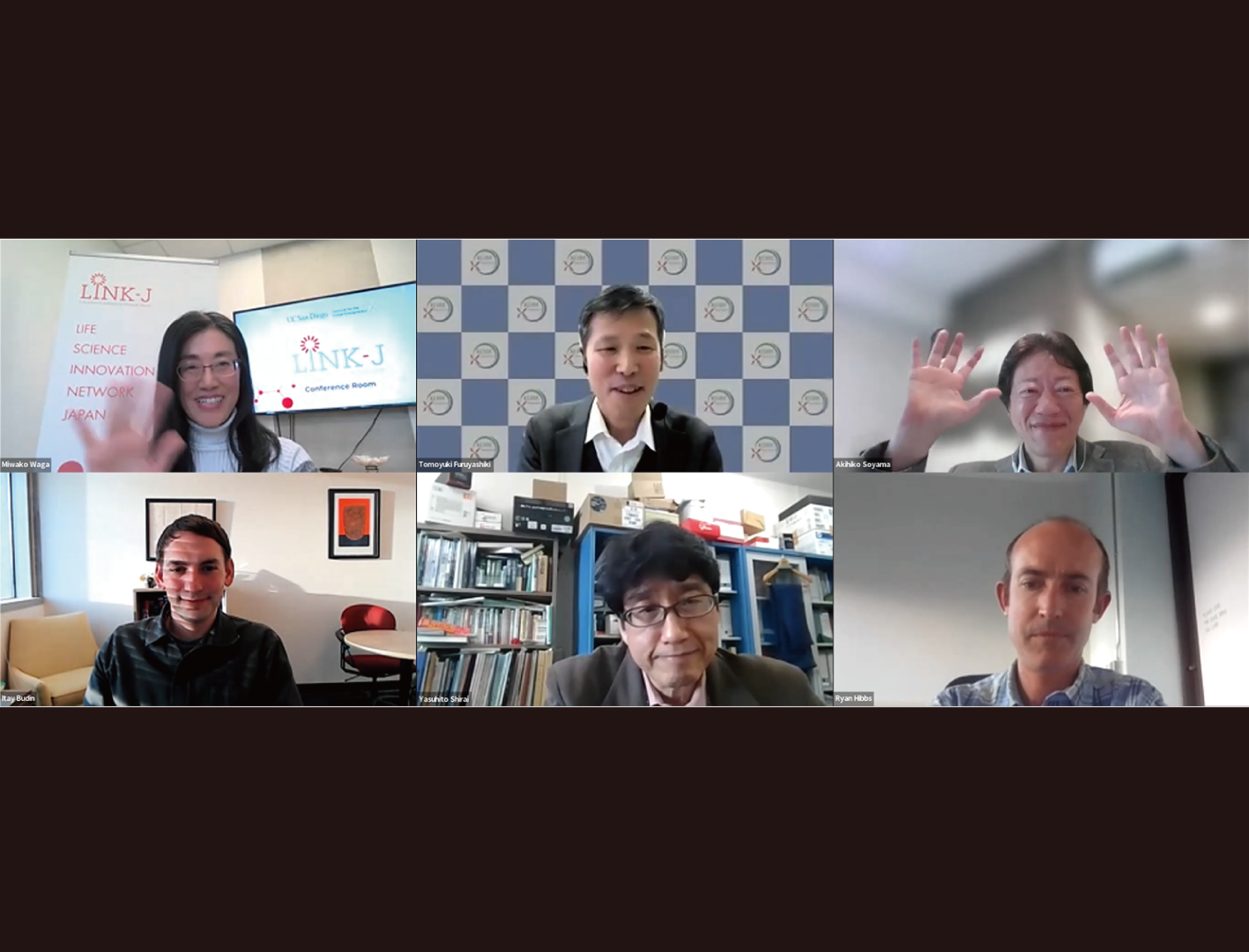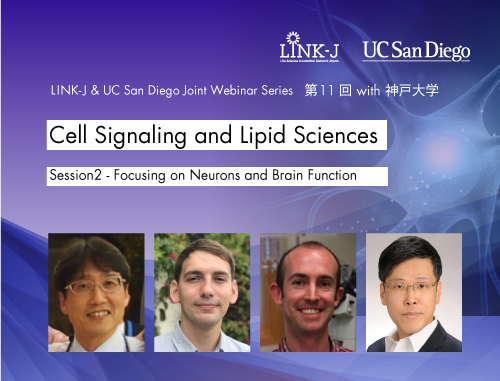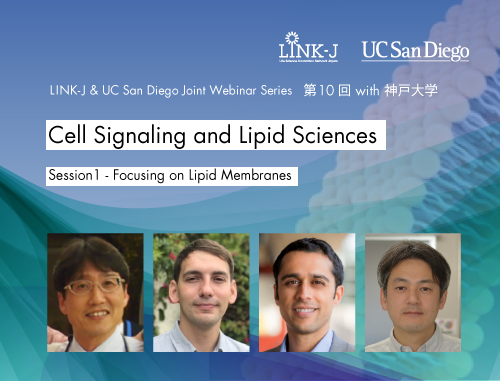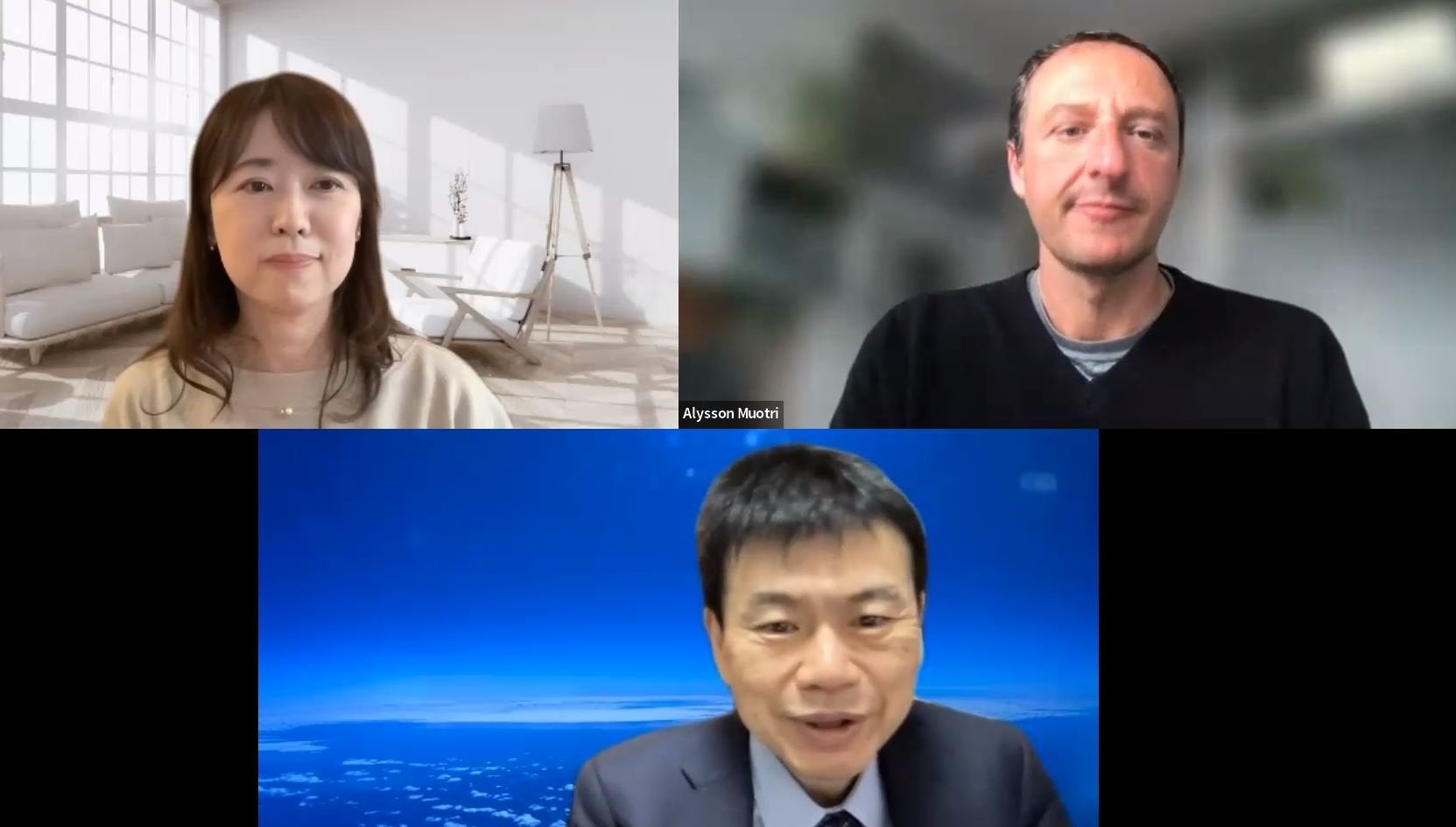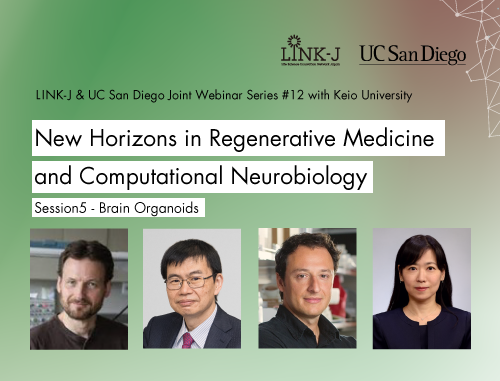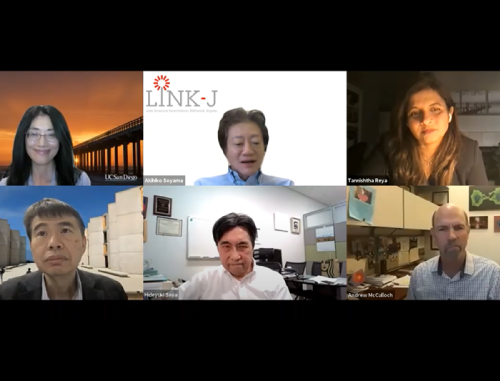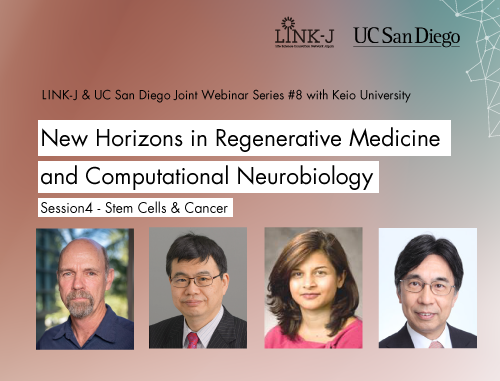UC San Diego and Kobe University have promoted research collaborations over the years in the fields of life science, computational science, and structural engineering. Lipids in biology and biochemistry have been a topic of great mutual interest thanks to the expertise at both institutions. For the “Cell Signaling and Lipid Sciences” joint webinar series, UC San Diego Cell Signaling Center researchers will share some of the latest research findings along with colleagues at the Biosignal Research Center and the Center for Medical Transformation at Kobe University Graduate School of Medicine.
Lipid components of cell membranes and their interactions with proteins have critical roles in cell migration, apoptosis, differentiation, and many other dynamic processes underlying biological functions. Lipids and lipid metabolites are essential components of the structure and function of the brain, and their dysregulation is related to several neurological diseases. In fact, the brain has the highest lipid content in our bodies apart from adipose tissue. In this session, two professors will discuss the signaling pathways associated with diseases such as cancer, focusing on various enzymes, especially lipid-phosphatase and kinase.
*Language:English (English-Japanese simultaneous interpretation available)
*English captions are available (you can choose to turn them on or off).
*Please note that LINK-J and UC San Diego, Kobe University are not responsible for any errors or omissions in the captions.
How to use captions: Managing and viewing closed captioning
For past UC San Diego-related events and reports, please click here.

Date: Tue, Nov 28th, 4:00-5:15pm (PST) / Wed, Nov 29th, 9:00 - 10:15am (JST)
Zoom Webinar
(Opens an external site)
Registration Fee
Free
Click ”Register here!” to open an external site.
How to participate
This event will be broadcasted on Zoom webinar.
Program
| Japan Time | Pacific Time | Agenda |
| 9:00-9:02 | 4:00-4:02 | Welcome - Akihiko Soyama, LINK-J and Miwako Waga, UC San Diego |
| 9:02-9:03 | 4:02-4:03 | Brief Remarks - Dr. Yasuhito Shirai, Professor, Kobe University Graduate School of Agricultural Science |
| 9:03-9:05 | 4:03-4:05 | Brief Remarks and UCSD Speaker Introduction - Dr. Itay Budin, Assistant Professor of Chemistry & Biochemistry and Bioengineering, UC San Diego |
| 9:05-9:30 | 4:05-4:30 | Presentation - "Illuminating the Biochemical Activity Architecture of the Cell" Dr. Jin Zhang, Professor and vice Chair, Department of Pharmacology & Professor, Departments of Chemistry & Biochemistry and Bioengineering |
| 9:30-9:34 | 4:30-4:34 | Q&A - moderated by Dr. Budin |
| 9:34-9:35 | 4:34-4:35 | Speaker introduction - Dr. Shirai |
| 9:35-10:00 | 4:35-5:00 | Presentation - "Hippo-YAP Signaling Pathway in Squamous Cell Carcinoma Onset and Progression" Dr. Tomohiko Maehama, Associate Professor, Kobe University Graduate School of Medicine |
| 10:00-10:14 | 5:00-5:14 | Q&A and Discussion - moderated by Drs. Shirai & Budin |
| 10:14-10:15 | 5:14-5:15 | Closing Remarks - Akihiko Soyama |
Presentation Abstracts
Dr. Zhang's talk
"Illuminating the Biochemical Activity Architecture of the Cell"
The complexity and specificity of cellular processes require spatial microcompartmentation and dynamic modulation of the underlying biochemical activities, such as dynamic phosphorylation and dephosphorylation catalyzed by specific protein kinases and phosphatases, respectively. We hypothesize that cellular biochemical activities are spatially organized into an “activity architecture” and reorganization and restructuring of this activity architecture lead to disease. In this talk, I will introduce a series of genetically encoded fluorescent biosensors that we have developed to monitor biochemical events in living cells, and then present a couple of studies where we combine quantitative fluorescence imaging with targeted perturbations as well as biochemical and functional assays to probe the subcellular regulation of cAMP/PKA and ERK signaling pathways.
Dr. Maehara's talk
"Hippo-YAP Signaling Pathway in Squamous Cell Carcinoma Onset and Progression"
The Hippo-YAP signaling pathway regulates organ size, tissue homeostasis, and tumorigenesis in mammals. The Hippo core complex which consists of MST and LATS kinases and their adaptor proteins, SAV1 and MOB1, blocks the translocation of YAP1/TAZ proteins to the nucleus, curtailing cell growth. Activation of YAP1/TAZ occurs in many human malignancies and promotes their initiation, progression and metastasis. To clarify the molecular mechanism of YAP-driven cancer development in vivo, we generated mice that were deficient for critical Hippo component MOB1 to increase intrinsic YAP activity.
The deletion of MOB1 in the tongue and cervix in mice resulted in the rapid and highly reproducible development of squamous cell carcinoma (SCC) in these tissues. Consistently, immunohistochemical analysis showed strong YAP activation in human cervical and tongue cancers from the pre-cancerous stage. Genetic alterations, such as TP53, PTEN, FAT1, frequently observed in tongue cancers all increased YAP activity in tongue cancer-derived cell lines, and the effect was additive. Risk factors for cervical cancer, such as cigarette smoke condensates and estrogen, also increased YAP activity in cervical epithelial cells. These observations suggest that genetic and environmental risk factors induce incremental activation of YAP. These cancer onsets may initiate when YAP activity eventually exceeds an oncogenic threshold, indicating Hippo-YAP signal as a major driver for for the onset of these SCCs.
This talk will focus on the molecular mechanism for SCCs with showing our recent progress in SCC mouse model studies. In addition, our recently developed potent YAP inhibitors will be discussed.
Biographies
Dr. Yasuhito Shirai, Professor, Graduate School of Agricultural Science, Kobe University
Yasuhito Shirai is a Professor and Vice Dean of the Graduate School of Agricultural Science at Kobe University. He also serves as the Director of Americas Division in the Institute for Promoting International Partnership.
Shirai earned his PhD in 1994 in the Graduate School of Agricultural Science, Kobe University. He became an Assistant Professor in the Graduate School of Science and Technology and then in the Biosignal Research Center (BSRC). While he was assistant professor at BSRC, he worked as a visiting scholar at the University California San Diego in 2000-2001. He was promoted to an Associate Professor in the BSRC and obtained a second PhD degree from the School of Medicine of Kobe University in 2005. Finally, he was promoted to a Professor in the Laboratory of Chemistry and Utilization of Animal Production Resources in the Department of Agrobioscience, Graduate School of Agricultural Science. He conducts signal transduction research focusing PKC and DGK to develop functional food, medical food, and medicine.
Dr. Itay Budin, Assistant Professor of Chemistry and Biochemistry, UC San Diego
Dr. Itay Budin is an Assistant Professor in the Departments of Chemistry & Biochemistry and Bioengineering at UC San Diego. Trained as a biophysicist, his lab investigates the interplay between lipid chemistry and cell membrane function. Dr. Budin received his PhD from Harvard University and carried out postdoctoral studies as a Miller Fellow at UC Berkeley. He is the recipient of the Walter Shaw Young Investigator Award in lipid biology from the American Society for Biochemistry and Molecular Biology and early career awards from the National Science Foundation and US Department of Energy.
Dr. Jin Zhang, Professor and vice Chair, Department of Pharmacology & Professor, Departments of Chemistry & Biochemistry and Bioengineering
Dr. Jin Zhang received her PhD in Chemistry from University of Chicago in 2000. After completing her postdoctoral work in the laboratory of Roger Tsien at UC San Diego, she joined the faculty of Johns Hopkins University School of Medicine in 2003. She was promoted to Professor of Pharmacology in 2013. In 2015 she moved back to UC San Diego and is currently Professor and Vice Chair in Department of Pharmacology. Research in her lab focuses on developing enabling technologies to probe the active molecules in their native environment and characterizing how these active molecules change in diseases including cancer. Dr. Zhang is a recipient of the Biophysical Society Margaret Oakley Dayhoff Award (2009), NIH Director’s Pioneer Award (2009), John J. Abel Award in Pharmacology (2012), Pfizer Award in Enzyme Chemistry (2012), NCI Outstanding Investigator Award (2015 and 2022), Robert R. Ruffolo Career Achievement Award in Pharmacology (2022), Protein Society Christian B. Anfinsen Award (2022) and Biophysical Society Carolyn Cohen Innovation Award from (2023). She was elected as a Fellow of the American Association for the Advancement of Science in 2014, a Fellow of the American Institute for Medical and Biological Engineering in 2019 and a Fellow of American Society for Pharmacology and Experimental Therapeutics in 2021. Dr. Zhang also received UC San Diego Chancellor's Award for Excellence in Postdoctoral Scholar Mentoring in 2019 and UC San Diego Jacobs School of Engineering Outstanding Graduate Student Mentoring Award in 2022.
Dr. Tomohiko Maehama, Associate Professor, Kobe University Graduate School of Medicine
Tomohiko Maehama is Associate Professor at the Graduate School of Medicine, Kobe University, Japan. He graduated from Tokyo Institute of Technology, Japan in 1990 and obtained his PhD degree in 1995 at the Graduate School of Bioscience there in the lab of Professor Toshiaki Katada. After a JSPS Research Fellow there and a Research Fellow at University of Michigan Medical School in the lab of Professor Jack E. Dixon, he became a Research Investigator at Tokyo Metropolitan Institute for Medical Science in 2000 and was promoted as a Laboratory Chief at National Institute of Infectious Diseases in 2006. Then he has been in the current position in Kobe University since 2016. His research interests are to elucidate molecular mechanisms of cancer development, particularly focusing on functions of tumor suppressors.
Participation Fee
Free
Organizer
Organizer:LINK-J
Co-organizer:University of California San Diego
